22 May Tune Into Virtual Morningsong Every Friday
Join us every Friday morning...

Join us every Friday morning...
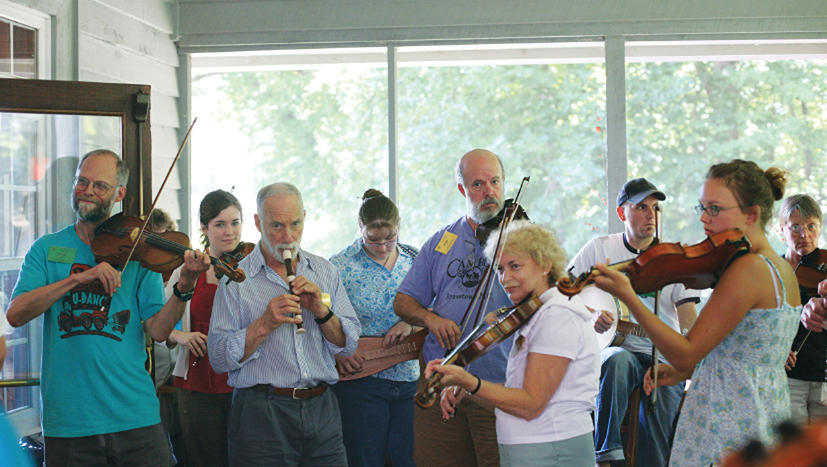 Dance Musicians Week students serenade folks as they enter the Dining Hall for lunch.[/caption]
[caption id="attachment_10346" align="alignright" width="256"]
Dance Musicians Week students serenade folks as they enter the Dining Hall for lunch.[/caption]
[caption id="attachment_10346" align="alignright" width="256"]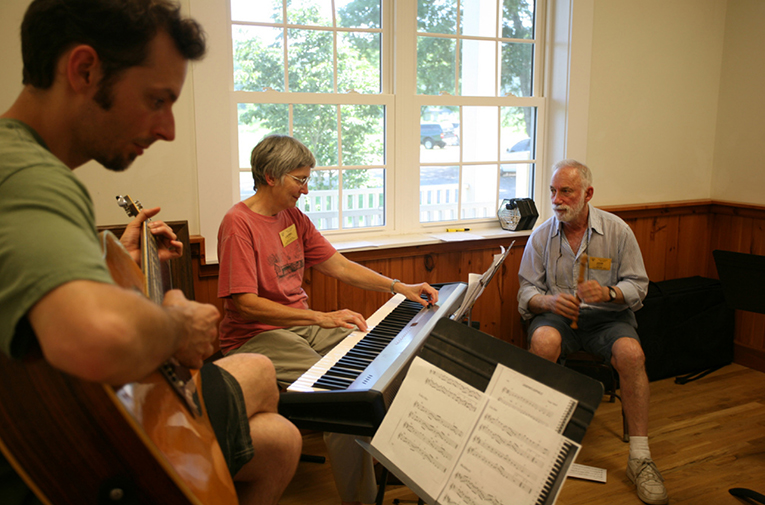 Student learn to play together as a dance band.[/caption]
In 2001, I received a message from Bob Dalsemer asking if I would join the instructor team for Dance Musicians Week at the John C. Campbell Folk School. Lifelong mentor, fiddler, caller and instructor extraordinaire David Kaynor had thrown my name out to Bob, the music and dance coordinator at the school at the time. At that point I was living in Western Massachusetts playing with David and the Greenfield Dance Band and had been devoting much of my time to being a touring singer songwriter. I had been in the contra dance scene picking tunes for about a decade. My musical influences were a woven patchwork of the folks that had surrounded me growing up in New York—Jay Unger, Lyn Hardy, Molly Mason, Sonny Ochs, Pete Seeger. Being born into a family of activists and labor organizers, community was most important and music was (and is) the vehicle and the glue that tied it all together. We were raised to believe that music and dance for music and dance’s sake is not enough. Community first.
[caption id="attachment_10347" align="alignleft" width="195"]
Student learn to play together as a dance band.[/caption]
In 2001, I received a message from Bob Dalsemer asking if I would join the instructor team for Dance Musicians Week at the John C. Campbell Folk School. Lifelong mentor, fiddler, caller and instructor extraordinaire David Kaynor had thrown my name out to Bob, the music and dance coordinator at the school at the time. At that point I was living in Western Massachusetts playing with David and the Greenfield Dance Band and had been devoting much of my time to being a touring singer songwriter. I had been in the contra dance scene picking tunes for about a decade. My musical influences were a woven patchwork of the folks that had surrounded me growing up in New York—Jay Unger, Lyn Hardy, Molly Mason, Sonny Ochs, Pete Seeger. Being born into a family of activists and labor organizers, community was most important and music was (and is) the vehicle and the glue that tied it all together. We were raised to believe that music and dance for music and dance’s sake is not enough. Community first.
[caption id="attachment_10347" align="alignleft" width="195"]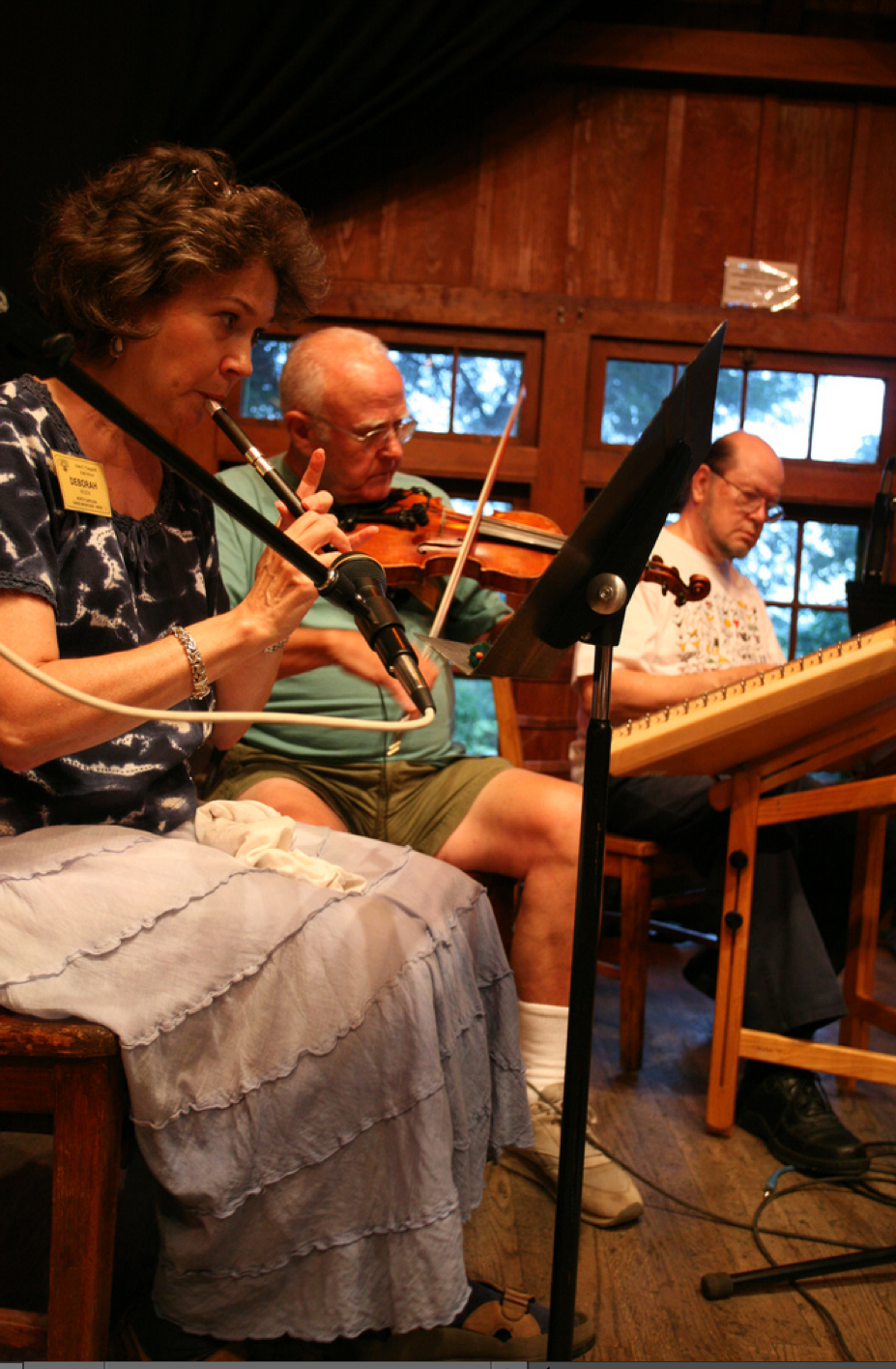 A band of DMW students takes the stage for one of the nightly contra dances.[/caption]
“Sing behind the plow!” is one of the great mottos of the John C. Campbell Folk School. Upon first look into the Folk School it seemed to be a kind of Brigadoon, a place stuck in time. Of course, I mean that in the best way. At that point in my life I was lamenting the waning of “community” in “community dance” and was excited to see a place nestled in the far west mountains of North Carolina, founded in the 1920s by the grandmother of the twentieth-century folk music revival, Olive Dame Campbell. Mrs. Campbell based the philosophy of the Folk School on the Danish tradition of folkenhojskolen which aims to foster culture and tradition through noncompetitive adult education—metalwork, quilting, woodwork, photography, cooking—happening alongside a rich tradition of music and dance, with folks from the surrounding Brasstown community invited to weekly concerts and dances and given special admittance into classes. I heard a student once comment “This place is like a kind of Whoville!” referencing the idealistic village from How the Grinch Stole Christmas. This is exemplified best by the very fact that each dance ends with a short goodnight song, sung with hands joined in a circle. The facilities are surrounded by hills, rivers, lush gardens, outdoor folky sculptures and paths through the woods. Best of all, the dancers are not contra “dancers”—they are mostly just folks from the community. Their gauge of a great experience is more based on who they got to see that night, not how slick the floor was or what tempo the band had played. I had found my place, or maybe the place found me!
A band of DMW students takes the stage for one of the nightly contra dances.[/caption]
“Sing behind the plow!” is one of the great mottos of the John C. Campbell Folk School. Upon first look into the Folk School it seemed to be a kind of Brigadoon, a place stuck in time. Of course, I mean that in the best way. At that point in my life I was lamenting the waning of “community” in “community dance” and was excited to see a place nestled in the far west mountains of North Carolina, founded in the 1920s by the grandmother of the twentieth-century folk music revival, Olive Dame Campbell. Mrs. Campbell based the philosophy of the Folk School on the Danish tradition of folkenhojskolen which aims to foster culture and tradition through noncompetitive adult education—metalwork, quilting, woodwork, photography, cooking—happening alongside a rich tradition of music and dance, with folks from the surrounding Brasstown community invited to weekly concerts and dances and given special admittance into classes. I heard a student once comment “This place is like a kind of Whoville!” referencing the idealistic village from How the Grinch Stole Christmas. This is exemplified best by the very fact that each dance ends with a short goodnight song, sung with hands joined in a circle. The facilities are surrounded by hills, rivers, lush gardens, outdoor folky sculptures and paths through the woods. Best of all, the dancers are not contra “dancers”—they are mostly just folks from the community. Their gauge of a great experience is more based on who they got to see that night, not how slick the floor was or what tempo the band had played. I had found my place, or maybe the place found me!
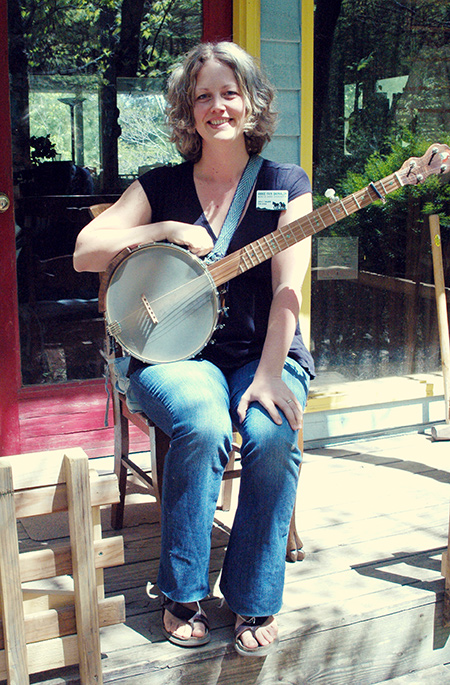 Annie Fain with her banjo[/caption]
Cory Marie: What’s is like returning to the Folk School Community as a full time resident and employee?
Annie Fain: It feels good in a deep down way. Many things are the same as they were when I was young, from the student name tags to the feel of the wooden dance floor in the Community room to the warmth of the community that surrounds the school.
Cory Marie: So, this isn’t the first time you’ve worked for the Folk School?
Annie Fain: In 2002, I came back from studying abroad at a folk school in Denmark and was awarded an upcoming craftsperson scholarship through the Southern Highland Craft Guild to take a class at Penland in Book Arts and Papermaking. I worked in the office at the Folk School as an Administrative Assistant to save for the class. It was during that time that Karen asked me to be the coordinator for Little/Middle Folk School.
I was 22 at the time and had participated in Little/Middle myself from the ages of 7-17. I was honored and eager for the challenge. Folk School people have always been very supportive and have taught me much. Later, I developed an awareness of marketing through eight years of self-employment as an artist, musician, and dancer. I took business and accounting classes, and realized the importance of being organized, marketing and networking.
Cory Marie: Are you going to stick with Bob’s plan or are you going to shake things up?
Annie Fain: Maybe a little of both! Since classes are booked a year in advance, I have the luxury of observing how 2014 develops. It gives me time to get my feet on the ground, and to get to know our audience. I plan to introduce new things within the context of how things have traditionally been done at the Folk School.
I've taken many classes at the Folk School in the past such as Cape Breton step dancing. Enrollment for dance classes has been down these last few years. I want to reassess and think about, not only bringing classes like those back, but how to fill them. I would also like to start a Cajun music and dance weekend!
Cory Marie: When did you start teaching at the Folk School?
Annie Fain: In 2004, I taught my first Book Arts class and then Bob Dalsemer hired me to teach clawhammer banjo and then Appalachian Clogging with my sister, Emolyn Liden. My father, David Liden, also a local musician, was usually my assistant for the banjo classes and it was great fun. I taught at least one banjo and book arts class every year from that time on.
[caption id="attachment_7897" align="aligncenter" width="350"]
Annie Fain with her banjo[/caption]
Cory Marie: What’s is like returning to the Folk School Community as a full time resident and employee?
Annie Fain: It feels good in a deep down way. Many things are the same as they were when I was young, from the student name tags to the feel of the wooden dance floor in the Community room to the warmth of the community that surrounds the school.
Cory Marie: So, this isn’t the first time you’ve worked for the Folk School?
Annie Fain: In 2002, I came back from studying abroad at a folk school in Denmark and was awarded an upcoming craftsperson scholarship through the Southern Highland Craft Guild to take a class at Penland in Book Arts and Papermaking. I worked in the office at the Folk School as an Administrative Assistant to save for the class. It was during that time that Karen asked me to be the coordinator for Little/Middle Folk School.
I was 22 at the time and had participated in Little/Middle myself from the ages of 7-17. I was honored and eager for the challenge. Folk School people have always been very supportive and have taught me much. Later, I developed an awareness of marketing through eight years of self-employment as an artist, musician, and dancer. I took business and accounting classes, and realized the importance of being organized, marketing and networking.
Cory Marie: Are you going to stick with Bob’s plan or are you going to shake things up?
Annie Fain: Maybe a little of both! Since classes are booked a year in advance, I have the luxury of observing how 2014 develops. It gives me time to get my feet on the ground, and to get to know our audience. I plan to introduce new things within the context of how things have traditionally been done at the Folk School.
I've taken many classes at the Folk School in the past such as Cape Breton step dancing. Enrollment for dance classes has been down these last few years. I want to reassess and think about, not only bringing classes like those back, but how to fill them. I would also like to start a Cajun music and dance weekend!
Cory Marie: When did you start teaching at the Folk School?
Annie Fain: In 2004, I taught my first Book Arts class and then Bob Dalsemer hired me to teach clawhammer banjo and then Appalachian Clogging with my sister, Emolyn Liden. My father, David Liden, also a local musician, was usually my assistant for the banjo classes and it was great fun. I taught at least one banjo and book arts class every year from that time on.
[caption id="attachment_7897" align="aligncenter" width="350"]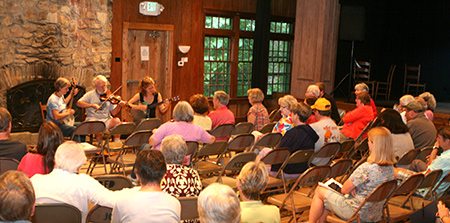 Martha, David and Annie Fain play Morningsong[/caption]
Cory Marie: I have been part of the Folk School community for only 2 years, so I’d like to hear about your story. Tell me about yourself.
Annie Fain: I was born in Charleston, West Virginia. Dad was there as part of a land study project for people who had sold their mineral rights to coal companies. The way my parents tell the story is that after my brother (Lindsey) was born, mom (Martha Owen) said "I'm going home to Murphy." Dad said, "Well, she had the kids and she had the check book," so he went with her!
Martha, David and Annie Fain play Morningsong[/caption]
Cory Marie: I have been part of the Folk School community for only 2 years, so I’d like to hear about your story. Tell me about yourself.
Annie Fain: I was born in Charleston, West Virginia. Dad was there as part of a land study project for people who had sold their mineral rights to coal companies. The way my parents tell the story is that after my brother (Lindsey) was born, mom (Martha Owen) said "I'm going home to Murphy." Dad said, "Well, she had the kids and she had the check book," so he went with her!
Brasstown Morris Dancers greeted the...
The stories of our lives...


